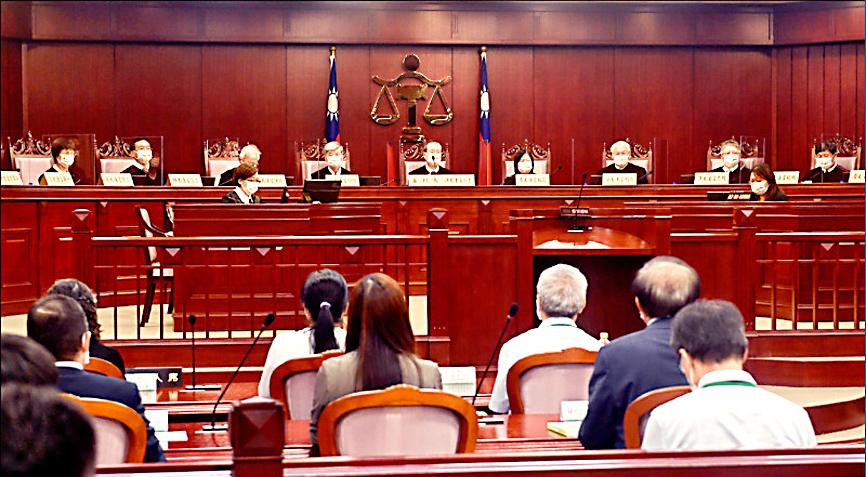The Constitutional Court yesterday ruled that imposing a life sentence or the death penalty for people convicted of selling narcotics is partly unconstitutional.
The authorities have to implement legal amendments within two years to reflect the ruling.
The court reviewed Constitutional Interpretation No. 476 based on 54 complaints stating that Article 4 of the Narcotics Hazard Prevention Act (毒品危害防治條例) only offered polarizing choices and gave judges very little room to adjudicate, potentially contravening articles 7, 8 and 23 of the Constitution.

Photo: Wu Cheng-feng, Taipei Times
Article 4 states that offenders who manufacture, transport or sell Category 1 narcotics are subject to a death sentence or life imprisonment, and may also be fined up to NT$30 million (US$943,456).
As defined by the act, Category 1 narcotics include morphine, cocaine, heroin, opium and their derivative products.
The intent of lawmakers to use life sentences to deter narcotics trafficking and use is evident, but the law fails to consider situations in which the accused is not guilty of other legal contraventions, the offense was minor or the case merits clemency, the judges said in their ruling.
Even if judges invoke Article 59 of the Criminal Code to reduce a defendant’s sentence, the crime would not merit such a heavy sentence, the ruling said.
Article 4 of the act risks being too rigid and inflexible, and the authorities should review the legal sentences that would be appropriate if the crime does not befit the sentence.
The ruling suggested that the authorities introduce fixed-term imprisonment as an alternative ruling or base the prison terms on the amount of narcotics sold and how many times the defendant has been accused of selling the product.
Starting from the day of the ruling until the legal amendments have been completed, any ruling regarding the trafficking of Category 1 narcotics should not only invoke Article 59 of the Criminal Code, but also reduce the already-reduced sentence by half, the court said.
Five of the petitions had been filed by narcotics traffickers and they can demand that the prosecutor general file a petition for an extraordinary appeal, the court said.

AIR SUPPORT: The Ministry of National Defense thanked the US for the delivery, adding that it was an indicator of the White House’s commitment to the Taiwan Relations Act Deputy Minister of National Defense Po Horng-huei (柏鴻輝) and Representative to the US Alexander Yui on Friday attended a delivery ceremony for the first of Taiwan’s long-awaited 66 F-16C/D Block 70 jets at a Lockheed Martin Corp factory in Greenville, South Carolina. “We are so proud to be the global home of the F-16 and to support Taiwan’s air defense capabilities,” US Representative William Timmons wrote on X, alongside a photograph of Taiwanese and US officials at the event. The F-16C/D Block 70 jets Taiwan ordered have the same capabilities as aircraft that had been upgraded to F-16Vs. The batch of Lockheed Martin

GRIDLOCK: The National Fire Agency’s Special Search and Rescue team is on standby to travel to the countries to help out with the rescue effort A powerful earthquake rocked Myanmar and neighboring Thailand yesterday, killing at least three people in Bangkok and burying dozens when a high-rise building under construction collapsed. Footage shared on social media from Myanmar’s second-largest city showed widespread destruction, raising fears that many were trapped under the rubble or killed. The magnitude 7.7 earthquake, with an epicenter near Mandalay in Myanmar, struck at midday and was followed by a strong magnitude 6.4 aftershock. The extent of death, injury and destruction — especially in Myanmar, which is embroiled in a civil war and where information is tightly controlled at the best of times —

Taiwan was ranked the fourth-safest country in the world with a score of 82.9, trailing only Andorra, the United Arab Emirates and Qatar in Numbeo’s Safety Index by Country report. Taiwan’s score improved by 0.1 points compared with last year’s mid-year report, which had Taiwan fourth with a score of 82.8. However, both scores were lower than in last year’s first review, when Taiwan scored 83.3, and are a long way from when Taiwan was named the second-safest country in the world in 2021, scoring 84.8. Taiwan ranked higher than Singapore in ninth with a score of 77.4 and Japan in 10th with

China's military today said it began joint army, navy and rocket force exercises around Taiwan to "serve as a stern warning and powerful deterrent against Taiwanese independence," calling President William Lai (賴清德) a "parasite." The exercises come after Lai called Beijing a "foreign hostile force" last month. More than 10 Chinese military ships approached close to Taiwan's 24 nautical mile (44.4km) contiguous zone this morning and Taiwan sent its own warships to respond, two senior Taiwanese officials said. Taiwan has not yet detected any live fire by the Chinese military so far, one of the officials said. The drills took place after US Secretary